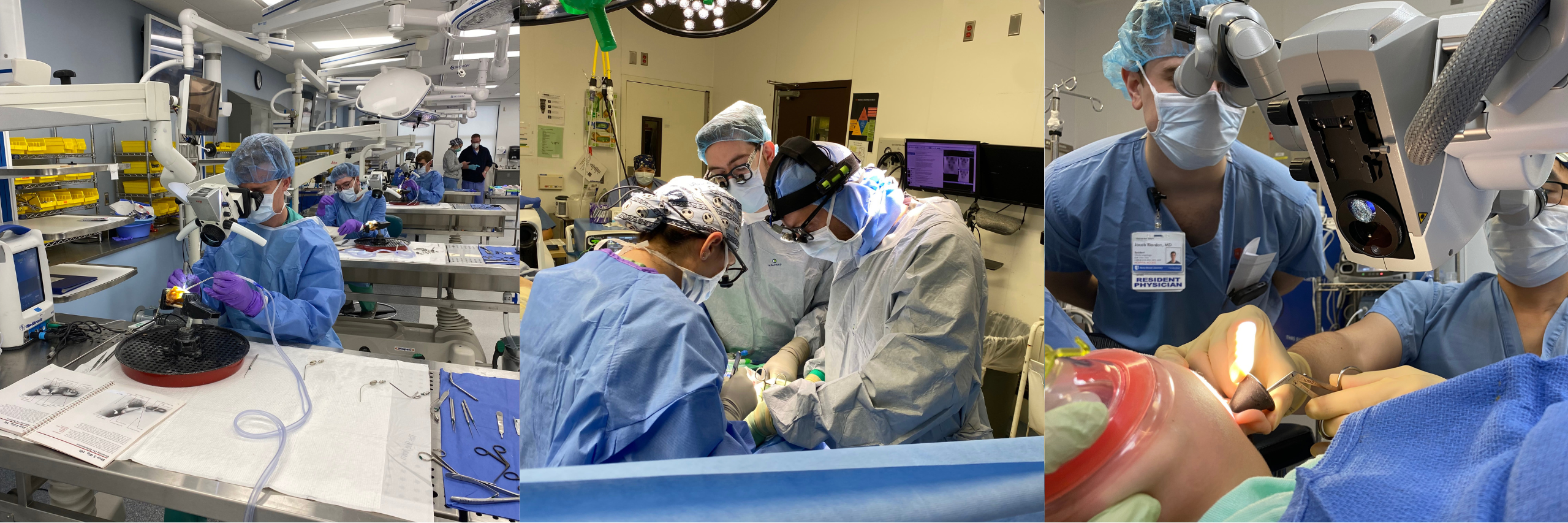Major Conditions Treated at an ENT Doctor Visit
Major Conditions Treated at an ENT Doctor Visit
Blog Article
Exploring the Area of Otolaryngology: What to Expect When You Seek Advice From an ENT
Otolaryngology, commonly described as ENT, incorporates the diagnosis and treatment of ear, nose, and throat conditions. For those experiencing associated issues, seeking advice from an ENT professional can offer clearness and relief. Understanding what to anticipate throughout such assessments is necessary for efficient interaction and care. This review will certainly detail crucial aspects of the ENT experience, consisting of typical reasons for brows through and the processes entailed in medical diagnosis and therapy.

Understanding Otolaryngology: An Overview
Otolaryngology, frequently described as ENT (Nose, ear, and throat) medication, is a specialized branch of medication that concentrates on the diagnosis and therapy of conditions impacting these crucial locations of the human body. This field encompasses a variety of conditions, consisting of those pertaining to hearing, equilibrium, respiratory system function, and speech. Otolaryngologists are educated to handle both medical and clinical therapies, using innovative methods and modern technologies. Their experience expands beyond traditional conditions, addressing issues such as allergic reactions, sinus infections, and hearing loss. In addition, they play a critical duty in the monitoring of head and neck cancers cells, offering thorough treatment tailored to private patient demands. In general, otolaryngology stays important for keeping wellness and lifestyle in afflicted people.
Common Factors to See an ENT Specialist
Several people look for the competence of an ENT professional for a selection of factors, showing the diverse nature of conditions that influence the throat, ear, and nose. Common concerns consist of persistent sinus problems, which typically results in persistent nasal blockage and facial discomfort. Allergic reactions and their associated signs and symptoms, such as itching and sneezing, also motivate visits to these professionals (ENT surgery). Hearing loss, whether gradual or abrupt, is another substantial reason for consultation. On top of that, people might look for assessment for throat problems, including persistent hoarseness or ingesting problems. Sleep apnea, identified by cut off breathing during sleep, is frequently attended to by ENT specialists. Each of these conditions highlights the relevance of specialized care in handling intricate ENT-related health and wellness issues
Planning for Your ENT Visit
When planning for an ENT appointment, it is essential to gather appropriate details and consider any type of particular issues. People should compile a comprehensive case history, consisting of previous ear, nose, or throat concerns, surgical treatments, and current medications. Documenting signs-- such as regularity, severity, and period-- can give beneficial insights for the ENT specialist. In addition, people need to prepare a list of questions they wish to ask, guaranteeing that all concerns are dealt with throughout the go to. Bringing along any type of relevant clinical documents or test outcomes can further assist the ENT in understanding the patient's problem. Ultimately, individuals need to validate their consultation details, consisting of date, time, and place, to lessen any kind of final confusion. Proper prep work can enhance the performance of the examination and lead to much better outcomes.
What to Anticipate During the Consultation
As the consultation begins, the person can anticipate to participate in a complete conversation with the ENT specialist concerning their signs and clinical background. The specialist will inquire concerning the duration, frequency, and extent of signs and symptoms such as hearing loss, nasal blockage, or aching throat. Furthermore, the patient's previous medical problems, medications, and any kind of relevant household background will be assessed, helping the expert in developing a complete understanding of the person's health. The ENT might additionally inquire about way of living factors, such as exposure to irritants or irritants. This read more open discussion establishes a structure for the appointment, guaranteeing that the individual's worries are attended to and establishing the stage for any type of necessary examinations or referrals for treatment.
Diagnostic Examinations and Procedures in Otolaryngology
A variety of analysis examinations and procedures are essential in otolaryngology to accurately assess and detect conditions impacting the nose, ear, and throat. Usual examinations include audiometry, which measures hearing feature, and tympanometry, analyzing center ear pressure. Nasal endoscopy allows visualization of the nasal flows and sinuses, while laryngoscopy examines the throat and singing cables. Imaging strategies, such as CT scans and MRIs, supply comprehensive views of head and neck structures. Allergic reaction screening might likewise be carried out to determine triggers for sinus or respiratory issues. These analysis tools enable ENT professionals to establish a detailed understanding of patients' problems, guaranteeing customized and effective monitoring strategies. Appropriate medical diagnosis is important for successful treatment outcomes in otolaryngology.
Treatment Alternatives Offered by ENT Specialists
ENT specialists offer a range of treatment alternatives tailored to attend to details conditions influencing the ear, throat, and nose. These treatments vary from traditional techniques, such as medication and lifestyle adjustments, to even more intrusive procedures. For example, allergies might be managed with antihistamines or immunotherapy, while persistent sinus problems may need nasal corticosteroids or sinus surgical procedure. For hearing loss, ENT experts frequently recommend hearing help or medical treatments like cochlear implants. In situations of throat conditions, choices can include speech therapy or surgeries to eliminate obstructions. In addition, they may supply assistance for taking care of rest apnea, consisting of using CPAP gadgets or surgical interventions. Overall, the objective is to improve people' high quality of life through personalized care and effective treatment strategies.
When to Seek Follow-Up Treatment With an ENT
When to look for follow-up care with an ENT specialist is crucial for taking care of continuous signs or issues related to ear, throat, and nose conditions, recognizing. Clients need to take into consideration scheduling a follow-up appointment if signs linger despite initial treatment, such as persistent ear discomfort, nasal congestion, or throat discomfort. Modifications in hearing, balance problems, or uncommon nasal discharge might also warrant more evaluation. In addition, if an individual experiences side results from recommended medicines or has undergone a surgery, follow-up care is very important to keep an eye on recuperation and address any issues. Timely examinations can guarantee efficient management of problems, stop prospective issues, and give satisfaction regarding one's health and wellness. Looking for follow-up treatment advertises aggressive wellness administration in otolaryngology.
Often Asked Questions

What Certifications Should I Seek in an ENT Specialist?
When looking for an ENT professional, one should look for board accreditation, pertinent experience, and solid client testimonials. Furthermore, efficient interaction skills and a thoughtful strategy can substantially improve the total therapy experience.
How Do I Pick the Right ENT for My Needs?
Picking the right ENT specialist entails evaluating their certifications, experience, and person evaluations (Voice). It is essential to consider their communication design and strategy to therapy, ensuring they straighten with the person's particular health needs and choices
Are There Any Type Of Threats Connected With ENT Procedures?
The dangers connected with ENT procedures may consist of infection, blood loss, anesthesia problems, and prospective damage to surrounding structures. People ought to review these risks with their doctor to recognize individual worries and warranty informed decisions.
Exactly How Can I Take Care Of Stress And Anxiety Prior To My ENT Consultation?
To manage anxiety before a consultation, individuals can practice deep breathing exercises, imagine positive outcomes, prepare concerns ahead of time, and seek support from close friends or family, fostering a sense of peace of mind and calmness.
What Should I Do if I Experience Adverse Effects From Therapy?
If side effects from therapy occur, the person needs to promptly report them to their doctor. Changes to therapy or extra treatments may be needed to ensure safety and security and performance in handling their condition - Voice. As the appointment begins, the person can expect to engage in a comprehensive conversation with the ENT specialist regarding their symptoms and medical background. These diagnostic devices enable ENT professionals to establish a comprehensive understanding of patients' conditions, making sure tailored and reliable administration plans. ENT professionals use a variety of therapy options tailored to resolve specific problems affecting the ear, throat, and nose. When seeking an ENT professional, one must look for board qualification, pertinent experience, and strong patient reviews. Selecting the ideal ENT professional involves examining their certifications, experience, and patient evaluations
Report this page